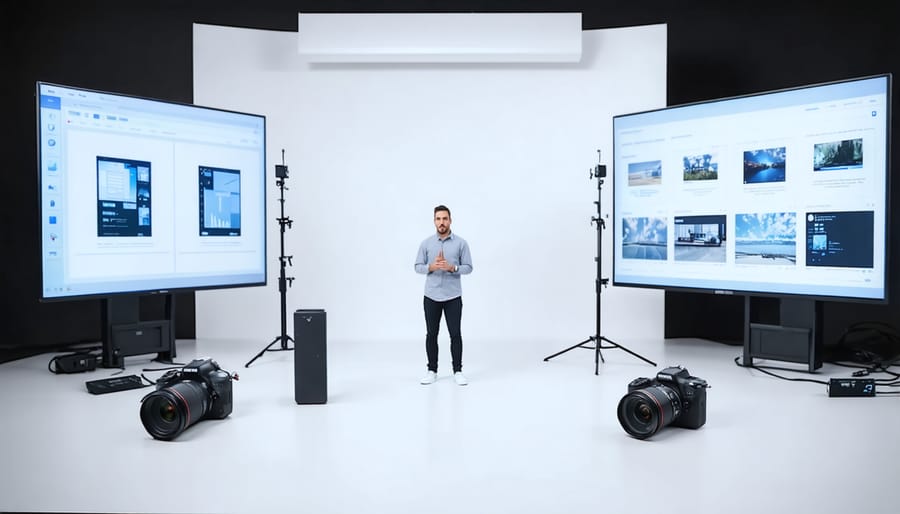The rise of hybrid events has fundamentally transformed how Canadian organizations connect with their audiences, creating unprecedented opportunities for engagement and reach. From Vancouver-based tech giant Hootsuite’s annual global conference combining in-person demos with virtual workshops, to Toronto International Film Festival’s groundbreaking hybrid screenings reaching millions worldwide, innovative organizations are redefining event possibilities. These pioneering examples demonstrate how hybrid formats enhance accessibility, maximize ROI, and create lasting impact across industries.
Leading Canadian companies have successfully implemented hybrid models for shareholders’ meetings, product launches, and professional development sessions, proving that seamless integration of physical and digital experiences drives meaningful engagement. The Canadian Chamber of Commerce’s nationwide policy forums now regularly connect regional business leaders with federal decision-makers through sophisticated hybrid platforms, while maintaining the gravitas of traditional in-person gatherings.
This evolution in event planning represents more than adaptation – it showcases Canadian innovation in creating inclusive, scalable experiences that resonate with modern audiences while preserving the irreplaceable value of face-to-face interaction.
Corporate Training and Development Events
Annual Leadership Summits
Leading Canadian organizations have successfully transformed their annual leadership summits into engaging hybrid experiences that combine the best of in-person and virtual formats. TD Bank Group’s 2022 Leadership Summit exemplified this approach by connecting 2,000 leaders across Canada through regional hub locations while leveraging advanced virtual networking capabilities to facilitate cross-country collaboration.
Shopify’s annual leadership conference demonstrates another innovative hybrid model, featuring intimate in-person gatherings at their Ottawa headquarters while simultaneously broadcasting keynote sessions to global team members. This format allows for meaningful face-to-face interactions while maintaining inclusive participation across their distributed workforce.
RBC’s Leadership Academy has adopted a year-round hybrid approach, combining quarterly in-person regional meetings with ongoing virtual training sessions. This blended format has increased engagement rates by 40% while reducing travel costs by 60%, according to their 2023 internal report.
The Canadian Public Service has also embraced hybrid leadership development, with their Executive Leadership Program hosting concurrent sessions across major cities while connecting participants through interactive virtual workshops. This approach has proven particularly effective for government organizations with nationwide operations, enabling consistent leadership development while respecting regional dynamics.
These examples showcase how organizations can maintain strong leadership development programs while adapting to modern workplace requirements through thoughtful hybrid event design.

Skills Development Workshops
Several Canadian organizations have successfully implemented hybrid skills development workshops, combining in-person and virtual training elements. The Toronto Technology Institute’s software development bootcamp serves as a prime example, where remote participants join live coding sessions alongside in-person students through high-quality streaming setups and collaborative development platforms.
KPMG Canada pioneered a hybrid financial analysis certification program that attracted professionals from across the country. The program featured hands-on workshops at regional offices while simultaneously connecting remote learners through interactive virtual labs. This approach resulted in a 40% increase in participation compared to traditional in-person-only sessions.
Vancouver-based BuildRight Construction implemented a hybrid safety training program that became an industry benchmark. On-site demonstrations were live-streamed to remote workers, while practical assessments were conducted through a combination of in-person evaluations and video submissions. The program achieved a 95% completion rate and received recognition from WorkSafeBC.
The Canadian Manufacturing Technology Centre offers a hybrid machine operation certification where participants complete theoretical components online and attend in-person sessions for practical training. This flexible format has enabled smaller manufacturers from rural areas to access essential skills development opportunities while minimizing travel costs.
These successful implementations demonstrate how hybrid training programs can effectively combine the benefits of face-to-face instruction with the accessibility of virtual learning, creating more inclusive and efficient skills development opportunities.

Industry Conferences and Trade Shows
Technology Sector Events
The technology sector has embraced hybrid events with remarkable success, showcasing how Canadian tech innovations are leading the way in creating engaging experiences. The Collision Conference, hosted in Toronto, exemplifies this approach by offering both in-person demonstrations and virtual access to global participants. Their hybrid model enables tech startups to pitch to international investors through high-quality streaming while maintaining intimate networking sessions on-site.
Web Summit Montreal implemented a innovative matchmaking platform that connects virtual attendees with physical exhibitors, resulting in a 40% increase in meaningful business connections compared to traditional formats. The platform uses AI-driven algorithms to suggest relevant connections based on attendee profiles and interests.
The Canadian Digital Summit stands out for its creative use of virtual reality lounges, where remote participants can interact with physical attendees through avatar-based networking spaces. This approach has proven particularly effective for companies showcasing software products, as it allows for real-time demonstrations to both in-person and online audiences.
Vancouver’s Tech Week successfully integrated hybrid components by offering virtual workshop tracks alongside physical keynotes. Their “digital-first” approach includes interactive polling, virtual breakout rooms, and seamless transitions between online and offline sessions. This format has become a blueprint for other tech conferences, demonstrating how hybrid events can effectively serve both local and international audiences while maintaining high engagement levels.
Manufacturing and Resource Events
The manufacturing and resource sectors have demonstrated remarkable innovation in adopting hybrid event formats, particularly in response to evolving industry needs. A notable example is the 2022 Canadian Mining Innovation Expo, which successfully connected over 5,000 participants across multiple sites in Ontario and British Columbia while maintaining a robust digital presence.
Vancouver-based forestry equipment manufacturer Thompson Industries revolutionized their quarterly dealer meetings by implementing a hybrid model that reduced travel costs by 60% while increasing dealer participation by 40%. Their approach combined in-person equipment demonstrations at their main facility with live-streamed technical sessions for international dealers.
The Alberta Oil & Gas Technology Symposium showcased how traditional industries can embrace digital transformation. Their 2023 event featured virtual facility tours, allowing international investors to explore production sites remotely while local stakeholders attended physical networking sessions. This format resulted in a 75% increase in international participation compared to previous in-person-only events.
Ontario’s Advanced Manufacturing Expo pioneered a “hub and spoke” model, where regional manufacturing centers hosted local gatherings while connecting to a central broadcast hub in Toronto. This approach enabled hands-on product demonstrations at multiple locations while maintaining seamless communication between sites through high-definition streaming and interactive displays.
These success stories highlight how resource-intensive industries can leverage hybrid formats to enhance reach, reduce environmental impact, and maintain crucial hands-on elements. The key to success has been carefully balancing physical demonstrations and networking opportunities with digital accessibility and engagement tools.
Product Launches and Marketing Events
Virtual Product Demonstrations
Virtual product demonstrations have emerged as a powerful hybrid event format, combining the immediacy of live presentations with the accessibility of digital platforms. Canadian tech giant Shopify pioneered this approach during their 2022 product launches, where they hosted simultaneous in-person demos at their Ottawa headquarters while streaming interactive 3D product visualizations to global audiences.
Companies are leveraging advanced streaming technology to create immersive experiences. For example, Vancouver-based Lululemon’s hybrid product showcases allow remote participants to view new athletic wear collections through multiple camera angles while in-person attendees can touch and try the products. Remote viewers can ask questions in real-time and receive responses from product specialists on the showroom floor.
“The key to successful hybrid product demonstrations is creating equal value for both in-person and virtual attendees,” notes Sarah Chen, Director of Event Innovation at Toronto’s EventTech Solutions. “This means incorporating interactive elements like real-time polls, virtual breakout rooms, and digital product manipulation tools.”
Montreal’s aerospace industry has also adapted this format effectively. Bombardier’s aircraft demonstrations now feature live walkthroughs for on-site clients while simultaneously offering virtual cockpit tours and technical specifications through augmented reality interfaces for international buyers.
These hybrid showcases typically achieve 300% more reach than traditional in-person demonstrations while maintaining the crucial element of personal interaction that drives sales conversions.

Hybrid Customer Experience Events
Customer engagement events have evolved significantly with hybrid formats offering unprecedented reach and flexibility. Leading Canadian retailers like Lululemon have successfully implemented hybrid product launches, combining in-store experiences with live-streamed demonstrations that allow online participants to interact with product specialists in real-time.
Financial institutions across Canada have embraced hybrid customer appreciation events, where VIP clients can choose between attending exclusive in-person sessions or joining virtually through sophisticated networking platforms. TD Bank’s annual investment symposium exemplifies this approach, connecting thousands of clients nationwide while maintaining personalized engagement.
Tech companies are pioneering innovative hybrid customer training sessions. Shopify regularly hosts hybrid merchant meetups where local businesses gather at regional hubs while remote participants join through interactive virtual environments. These events feature live Q&A sessions, product demonstrations, and networking opportunities that seamlessly blend physical and digital experiences.
Vancouver-based customer service software company Zendesk demonstrates the power of hybrid user conferences, combining local workshops with virtual breakout rooms. Their approach allows customers to experience hands-on product training while enabling global participation and knowledge sharing.
Tourism operators have also adapted their customer engagement strategies, with companies like Rocky Mountaineer offering hybrid travel showcases. These events combine in-person destination previews with virtual tours, allowing potential travelers to explore offerings and interact with travel experts regardless of their location.
Educational and Professional Development
Professional Certification Programs
Professional associations across Canada are revolutionizing certification training through hybrid delivery models. The Canadian Professional Sales Association (CPSA) successfully implemented a hybrid certification program where participants complete online modules at their own pace while attending monthly in-person skill-building workshops. This blended approach has increased completion rates by 35% compared to traditional methods.
The Project Management Institute’s Southern Ontario Chapter offers hybrid PMP certification preparation, combining virtual study sessions with physical networking events. Participants benefit from recorded content accessibility while maintaining valuable face-to-face interactions with instructors and peers.
The Insurance Institute of Canada has adapted its licensing programs to include both virtual examinations and in-person practical assessments. This flexible format allows professionals from remote regions to pursue certification without extensive travel, while ensuring hands-on skills are properly evaluated.
Notable success comes from the Canadian Marketing Association’s Digital Marketing Certification, where live-streamed masterclasses are complemented by regional meetups. This format has proven particularly effective for working professionals, with a 92% satisfaction rate among participants who appreciate the balance between convenience and networking opportunities.
Academic Conferences
Academic institutions across Canada have successfully embraced hybrid events, creating inclusive learning environments that combine in-person and virtual participation. The University of Toronto’s Annual Research Symposium stands out as a prime example, connecting over 2,000 researchers from 15 countries through a sophisticated digital platform while maintaining traditional presentations on campus.
McGill University’s International Conference on Climate Change Adaptation demonstrated the power of hybrid formats by enabling real-time collaboration between on-site attendees and remote participants from developing nations. The event featured interactive workshops, virtual poster sessions, and seamless networking opportunities through a custom-built mobile app.
The Western Canadian Conference on Computing Education showcased how hybrid events can increase accessibility while maintaining academic rigour. By implementing virtual breakout rooms and digital whiteboarding tools, organizers facilitated dynamic discussions between in-person and online participants. The conference achieved a 40% increase in international attendance compared to previous in-person-only events.
These academic gatherings prove that hybrid formats can enhance collaboration, expand reach, and create more equitable access to knowledge sharing opportunities within the academic community.
As we’ve explored throughout this article, hybrid events have become an integral part of Canada’s business landscape, offering unprecedented flexibility and reach for organizations of all sizes. The successful implementation of these events across various sectors demonstrates their versatility and staying power in our increasingly digital world.
Looking ahead, future trends in corporate events point toward even more sophisticated integration of virtual and in-person experiences. Industry experts predict increased adoption of AI-powered networking tools, enhanced virtual reality experiences, and more personalized attendee journeys.
Canadian businesses are particularly well-positioned to leverage these developments, thanks to our robust digital infrastructure and innovative tech sector. The key to success lies in maintaining the human element while maximizing technological advantages. Organizations that master this balance will continue to see higher engagement rates and stronger ROI from their hybrid events.
As we move forward, expect to see more seamless integration between physical and digital spaces, improved accessibility features, and greater emphasis on sustainable event practices. The hybrid model isn’t just a temporary solution – it’s evolving into a strategic advantage for forward-thinking Canadian businesses.
Remember that successful hybrid events require careful planning, clear objectives, and a willingness to adapt to changing technologies and audience needs. By staying informed about emerging trends and maintaining focus on attendee experience, Canadian organizations can continue to lead in this exciting space.
